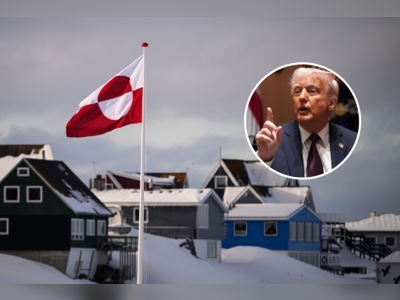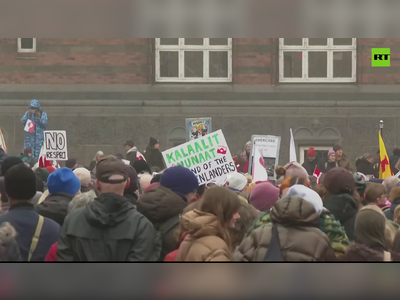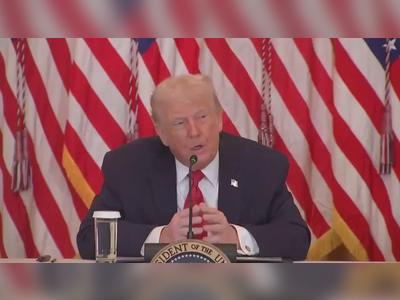
Hungarian Parliament Passes Bill Banning Pride Events
Legislation aimed at protecting children's rights limits assembly freedoms, inciting protests among opposition lawmakers.
On Tuesday afternoon, the Hungarian Parliament approved a controversial bill aimed at banning events related to homosexuality, citing the protection of children's rights.
The legislation was passed with 136 votes in favor and 27 against, with no abstentions, and it prohibits gatherings that promote homosexuality.
Organizers and participants of such events could face fines of up to 200,000 forints.
The proposal was supported not only by the ruling Fidesz–KDNP coalition but also by representatives from Jobbik and Mi Hazánk.
An unexpected vote from a representative from the opposition Democratic Coalition, who later told the parliament clerk of his mistake, added to the confusion.
Notably, several high-ranking officials, including Prime Minister Viktor Orbán, abstained from voting.
Opposition members from the Momentum party protested before the vote by lighting smoke candles, playing the Soviet anthem, and distributing imagery depicting Orbán and Russian President Vladimir Putin in a compromising embrace.
"We will not allow this!" chanted the protesting lawmakers.
Latorcai János, who was leading the session, urged attendees to remain calm, claiming that the majority conducted their work honorably.
Kocsis Máté, the leader of the Fidesz faction, criticized the opposition for their actions, calling them "foreign-funded Bolsheviks" and expressing concerns about the use of smoke devices that could harm health.
He reported that a fellow representative, recovering from COVID-19, required urgent medical assistance due to the smoke.
The legislative change was proposed by six government-affiliated representatives early Tuesday morning and was pushed through Parliament in an expedited process.
The Fidesz party prioritized this amendment, voting on the assembly law before considering a constitutional amendment that asserts a child's right to protection over older constitutional freedoms such as the right to assembly and free expression.
Under the newly passed law, assemblies promoting any deviation from one's birth gender or homosexuality are now explicitly banned.
Police will be authorized to use facial recognition technology to identify participants in these gatherings.
This legislation builds on provisions of a 2015 law that was initially justified by the need for enhanced international cooperation in criminal matters and counter-terrorism.
Concerns have persistently raised about the potential misuse of such surveillance methods during protests.
Both organizers and participants of banned gatherings will face legal penalties, with fines ranging from a minimum of 6,500 forints to the maximum of 200,000 forints.
The law specifically prohibits mitigating fines through community service or detention, with collected fines earmarked for child protection initiatives.
The Hungarian Helsinki Committee has stated that the amendment violates fundamental rights such as the prohibition of discrimination, the right to assembly, and the right to personal data protection.
Co-chair Kádár András commented that there is no scientific evidence linking the mention of homosexuality or the public discussion of sexual minorities to any adverse effects on children.
He asserted that withholding relevant information about sexuality only harms children's interests.
When questioned, Gulyás Gergely, the Minister heading the Prime Minister's Office, could not provide research supporting claims that Pride events negatively affect children's healthy development, reasoning that common sense justifies the government's stance against such demonstrations.
The bill has been met with strong opposition, with various lawmakers asserting that it represents a step toward authoritarianism, accusing the government of attacking civil rights.
Despite the parliament's vote, Budapest’s Mayor Gergely Karácsony affirmed his commitment to protecting LGBTQ+ rights and announced plans for this year's Pride event, emphasizing its importance for freedom and equality.
Opposition groups have planned protests against the decision to limit assembly rights, framing the development as a slide toward a more repressive political environment.
The passage of this law is seen as part of a broader agenda by the ruling coalition to consolidate power and further marginalize LGBTQ+ communities in Hungary.
The legislation was passed with 136 votes in favor and 27 against, with no abstentions, and it prohibits gatherings that promote homosexuality.
Organizers and participants of such events could face fines of up to 200,000 forints.
The proposal was supported not only by the ruling Fidesz–KDNP coalition but also by representatives from Jobbik and Mi Hazánk.
An unexpected vote from a representative from the opposition Democratic Coalition, who later told the parliament clerk of his mistake, added to the confusion.
Notably, several high-ranking officials, including Prime Minister Viktor Orbán, abstained from voting.
Opposition members from the Momentum party protested before the vote by lighting smoke candles, playing the Soviet anthem, and distributing imagery depicting Orbán and Russian President Vladimir Putin in a compromising embrace.
"We will not allow this!" chanted the protesting lawmakers.
Latorcai János, who was leading the session, urged attendees to remain calm, claiming that the majority conducted their work honorably.
Kocsis Máté, the leader of the Fidesz faction, criticized the opposition for their actions, calling them "foreign-funded Bolsheviks" and expressing concerns about the use of smoke devices that could harm health.
He reported that a fellow representative, recovering from COVID-19, required urgent medical assistance due to the smoke.
The legislative change was proposed by six government-affiliated representatives early Tuesday morning and was pushed through Parliament in an expedited process.
The Fidesz party prioritized this amendment, voting on the assembly law before considering a constitutional amendment that asserts a child's right to protection over older constitutional freedoms such as the right to assembly and free expression.
Under the newly passed law, assemblies promoting any deviation from one's birth gender or homosexuality are now explicitly banned.
Police will be authorized to use facial recognition technology to identify participants in these gatherings.
This legislation builds on provisions of a 2015 law that was initially justified by the need for enhanced international cooperation in criminal matters and counter-terrorism.
Concerns have persistently raised about the potential misuse of such surveillance methods during protests.
Both organizers and participants of banned gatherings will face legal penalties, with fines ranging from a minimum of 6,500 forints to the maximum of 200,000 forints.
The law specifically prohibits mitigating fines through community service or detention, with collected fines earmarked for child protection initiatives.
The Hungarian Helsinki Committee has stated that the amendment violates fundamental rights such as the prohibition of discrimination, the right to assembly, and the right to personal data protection.
Co-chair Kádár András commented that there is no scientific evidence linking the mention of homosexuality or the public discussion of sexual minorities to any adverse effects on children.
He asserted that withholding relevant information about sexuality only harms children's interests.
When questioned, Gulyás Gergely, the Minister heading the Prime Minister's Office, could not provide research supporting claims that Pride events negatively affect children's healthy development, reasoning that common sense justifies the government's stance against such demonstrations.
The bill has been met with strong opposition, with various lawmakers asserting that it represents a step toward authoritarianism, accusing the government of attacking civil rights.
Despite the parliament's vote, Budapest’s Mayor Gergely Karácsony affirmed his commitment to protecting LGBTQ+ rights and announced plans for this year's Pride event, emphasizing its importance for freedom and equality.
Opposition groups have planned protests against the decision to limit assembly rights, framing the development as a slide toward a more repressive political environment.
The passage of this law is seen as part of a broader agenda by the ruling coalition to consolidate power and further marginalize LGBTQ+ communities in Hungary.
AI Disclaimer: An advanced artificial intelligence (AI) system generated the content of this page on its own. This innovative technology conducts extensive research from a variety of reliable sources, performs rigorous fact-checking and verification, cleans up and balances biased or manipulated content, and presents a minimal factual summary that is just enough yet essential for you to function as an informed and educated citizen. Please keep in mind, however, that this system is an evolving technology, and as a result, the article may contain accidental inaccuracies or errors. We urge you to help us improve our site by reporting any inaccuracies you find using the "Contact Us" link at the bottom of this page. Your helpful feedback helps us improve our system and deliver more precise content. When you find an article of interest here, please look for the full and extensive coverage of this topic in traditional news sources, as they are written by professional journalists that we try to support, not replace. We appreciate your understanding and assistance.











